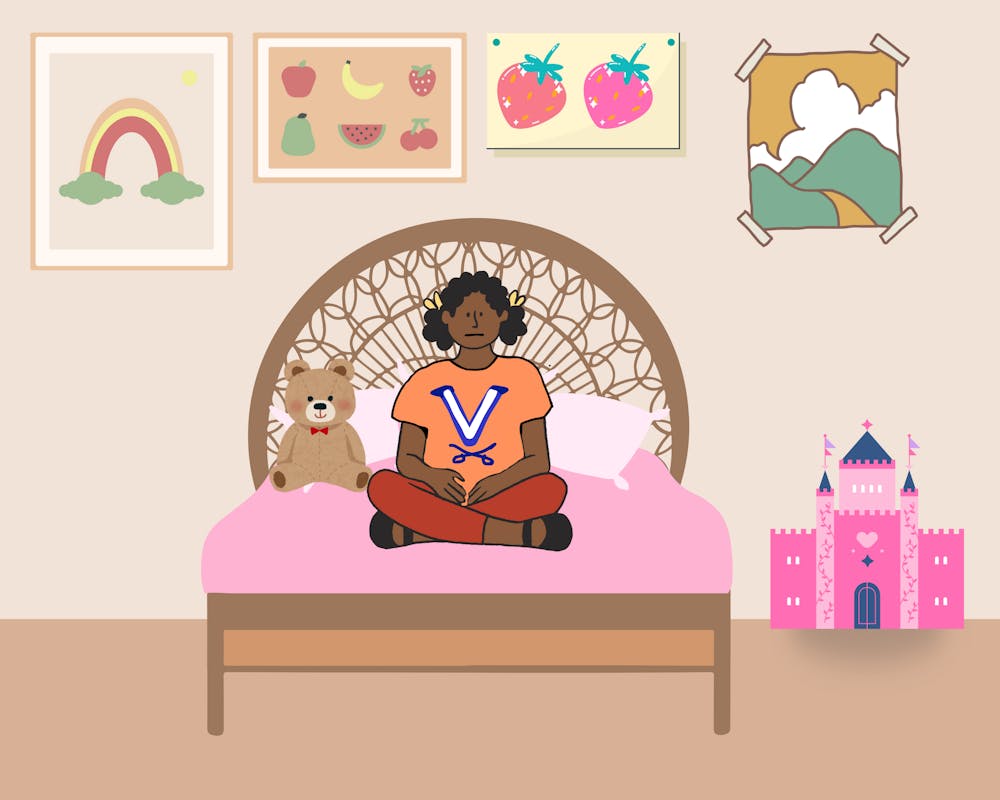Within 48 hours of being home for summer break, I was fighting with my mom about my piles of IKEA bags scattered throughout my home, fresh from my first-year dorm. I had been living on my own for nearly nine months — managing classes, job applications and semi-adult crises — and I had started to feel capable, self-sufficient, maybe even grown up. So why was I suddenly acting like I hadn’t changed at all?
Now, having been back in my childhood bedroom for over a month, surrounded by pictures of my childhood friends, cherished stuffed animals and my high school graduation gown peeking through my closet, I can confirm that I essentially feel 17 again — dramatic, defensive and somehow convinced that dirty dishes should not be my problem.
I call it “the season of regression.” It’s the weird emotional whiplash that strikes as soon as you return home from college and fall right back into patterns that, after stepping foot on Grounds, you thought you’d never return to. In my case, I went from happily sipping overpriced coffees in Shannon to dodging the enraging, yet quintessential questions from my parents like “Where are you going?” and “Are you really going to wear that?”
The downturn is subtle at first. I came home feeling confidently independent, maybe even mature, before starting to realize I’ve yet again started answering my parents in monosyllables or, notably, getting irrationally annoyed seeing my 13-year-old sister wearing the clothes I had left behind. I’ve found myself retreating into old habits — slamming my door after a squabble with my brother about leftovers, sulking in the car and, worst of all, spending my post-finals free time scrolling through quick-add on Snapchat. It’s not cute.
Because of these regressive habits, nothing about how my family views me has really changed — and that’s the root of what’s been so bothersome. I returned home from my first year of college expecting them to treat me like the independent, self-assured person I became when I was away. But they don’t know yet that I’m no longer the moody teenager who needs reminders to pick up after myself — specifically, to wash my dishes that I forgot about. The dynamic is too familiar, as if I was cast to play a role in a play that I didn’t realize I was still in.
I love my family. I really do. They have supported me in ways I probably don’t even realize, and sometimes I take that for granted. But the version of me that exists in my childhood home is not the one I’ve spent all year attempting to become. At school, I am self-sufficient, go places without explanation and sleep until 11 a.m. if I so choose. At home, I slip back into the teenage persona of an argumentative, overly confident eldest daughter and, to my dismay, one who rarely wins in an argument.
From personal research and a few intro psychology classes, I’ve found that regression is a real psychological phenomenon. Your brain associates your surroundings with past behaviors and defaults to them for comfort, which is why returning to old environments can trigger previous emotional states.
For me, this concept manifests with my emotional tie to home. It is where many of us formed our first ideas of who we are, specifically in relation to the other people around us — parents, siblings, friends and community. And it's hard to edit that script overnight, even if we ourselves feel “changed.”
I want to believe that college has made me a better person — more grounded, more thoughtful. However, just when I think it has, I snap at my sister for wearing my skirt that I swear I will wear again. These “slip-ups” aside, being back at home reminds me that growth manifests even if it's not always immediately visible, especially to those who think they know you best. It's very easy to regress when no one knows to expect different behavior from you.
Rather than seeing my regressive tendencies as a setback, I’ve chosen to view them as a mirror. When I catch myself echoing the sharp, defensive comments I used to rely on as ammunition, I ask myself what it actually is that I’m reacting to. Am I upset about the comment my mom made, or is it the apparent fragility of my independent routine I’d spent the past nine months perfecting? Am I annoyed at my family, or just overwhelmed at the juxtaposition of two versions of myself, both present at once?
Summer break — especially the first one after “fleeing the nest” — is strange. I’m back in my childhood home, but I’m also aware that I don’t completely belong there anymore. It’s like living in a sort of in-between — a limbo between who I was and who I’m becoming, where everything feels familiar but not exactly my own.
But maybe that discomfort is okay. I think that it could be proof that I have changed, that I’m no longer the 17-year-old who stormed out of family dinner early — even if I’m still tempted to. And maybe, just maybe, next time I’ll do the dishes before anyone has to ask.







